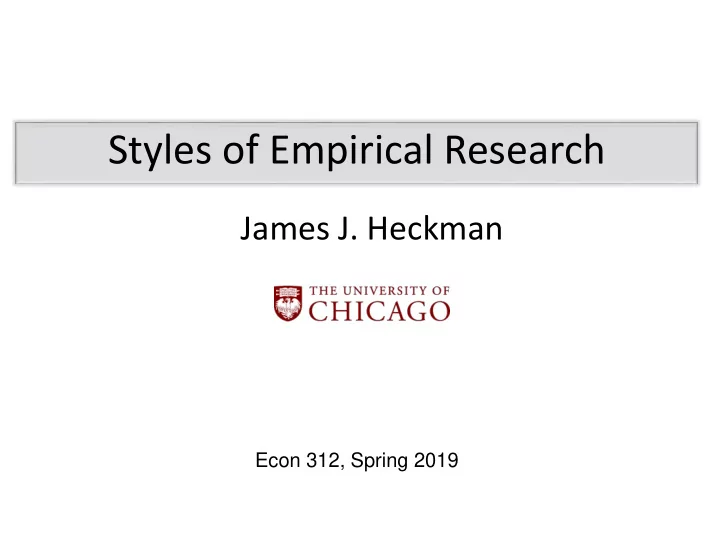

Styles of Empirical Research James J. Heckman Econ 312, Spring 2019
Descriptive Studies "Causal" Analysis "Structural" Calibration ("Just the facts") (Experiments or Analysis Natural Experiments) "Treatment Effects" Link to precisely Indirect Estimate "the Tight link Tight link formulated (focus on "facts") effect"; question models being addressed is often not formulated within a precise economic model Use of primary Central Central Central More casual ("go to the data shelf for the estimates") or else pick a few "relevant" moments of the data Computational Simple analysis; basic Linear models often Depends on Economic models complexity statistics (sometimes favored, IV Central problem (some complex; mixed complex statistical (TSLS popular); but simple; modern estimation (sample analysis) nonlinearity in game theory, moments: selected matching and other dynamics, and means and variances) models contract theory and simulation can produce complex models) Heckman Empirical Research Styles
Descriptive "Causal" Analysis "Structural" Calibration Studies (Experiments or Natural Analysis ("Just the facts") Experiments) "Treatment Effects" Replication Lots of testing Sometimes emphasized in Often hard given Sensitivity analyses and robustness the better papers; use of computational in computation of checks; use of multiple data set costs; estimation on the model; multiple data sets confirmation is encouraged. one data set alone is sensitivity to (see Fogel on Styles vary widely, however, common. alternative Kuznets) and many papers report a Computational costs parameters finding based on one IV and are falling. sometimes one data set. explored. Auxiliary Use of linear Linearity; "simple" methods Distributional Explicit functional assumptions models and encouraged (TSLS) casual in assumptions and forms for the simple statistics. model specification functional forms. models based on Recent work familiar models. develops nonparametric versions. Sources of Not an issue IV intuition (search for Sometimes unclear; Not considered identification instrument or exclusion) like all approaches, (possible mismatch (Randomization is an requires external between estimates instrument) variation; cross used and model equation restrictions consistency) Heckman Empirical Research Styles
Descriptive "Causal" Analysis "Structural" Calibration Studies (Experiments or Analysis ("Just the facts") Natural Experiments) "Treatment Effects" Goodness of fit Simple summaries Focus on various Sometimes compares Fit a few selected (no model; no means (but fitted to actual models if any at all notion of fit) quantiles also distributions as tests and check receive scrutiny) of model; however, agreement with more often only selected moments. means are tested Audience General General and Specialists Specialists specialists Rules (i) Carefully (i) Clever (i) Explicit models (i) Rigorous document instruments (interpretable economics sources (ii) Novel data sets economic (ii) Casual about (ii) Fit in general (iii) Tests of parameters) empirical input context overidentification (ii) Formal tests ("Stylized Facts") (iii) Emphasis on assumptions (iii) Sometimes and tests of fit novel data sets (iv) Little attention sources of to economic identification not so interpretation of clear what is being estimated Heckman Empirical Research Styles
Descriptive "Causal" Analysis "Structural" Calibration Studies (Experiments or Analysis ("Just the facts") Natural Experiments) "Treatment Effects" Policy Analysis Broad outcomes General "policy (i) Welfare costs Explicit welfare and (however, effects"; evaluation (costs of business policy analysis description often of policies in place; cycles) (i) Welfare costs phases into no measures of (ii) Voting (costs of business causality) welfare or cost outcomes cycles) benefit; no attempt (iii) A framework (ii) Voting to evaluate policies for evaluating new outcomes never previously policies never tried tried Examples in Kuznets; Fogel; Angrist, Krueger, Pakes; Berry; Keane Prescott and Profession Friedman and Pischke, etc. and Wolpin; and Kydland; Kapland Schwartz; Summers Hansen and and Violante, Ríos and Heston; Goldin Sargent Rull; many papers and Katz in macroeconomics Heckman Empirical Research Styles
Recommend
More recommend